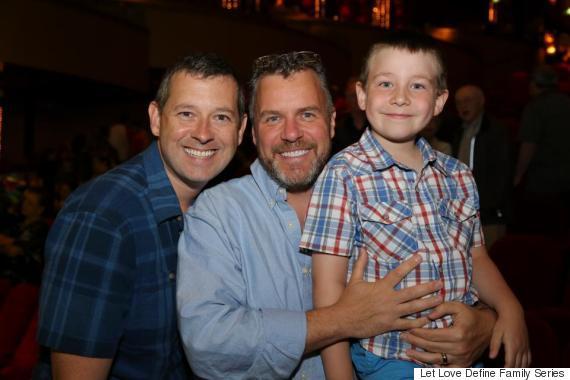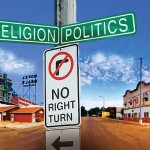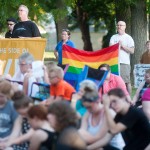Image: Let Love Define Family Series
“We believe that men will be punished for their own sins …” — LDS Article of Faith 2
This past week, news of a change in the Mormon (LDS) Church’s policy regarding LGBT members and their children was leaked to the press, leaving many Mormons reeling. According to reports, children living in a same-sex household can no longer be blessed as infants or baptized until they are 18. (Mormon children are typically baptized at eight years old.) Once they reach the age of 18, if they wish to join the Church, the children must “disavow” the practice of same-sex cohabitation and marriage and leave the household of their parents.
When I first heard about the Mormon church’s policy change regarding the children of LGBT members, I was in disbelief. As a former Mormon myself, I will admit to sometimes being a little too eager to believe the worst about my former church. But this was too much to believed. Surely, someone has misinterpreted the policy, I thought.
As a lawyer, I am trained to always start with the text, before jumping to conclusions or drawing inferences about what the law is. We go to the statute or the judicial decision and carefully read the language. So the lawyer in me immediately wanted to see to the text of the Church’s new policy regarding LGBT members and their children. I expected to find that the reports about the new policy had been misinterpreted or overstated. It turns out, it is actually worse than what was reported.
Here is what the text actually says:
“Children of a Parent Living in a Same-Gender Relationship
A natural or adopted child of a parent living in a same-gender
relationship, whether the couple is married or cohabiting, may not
receive a name and a blessing.A natural or adopted child of a parent living in a same-gender
relationship, whether the couple is married or cohabiting, may be
baptized and confirmed, ordained, or recommended for missionary
service only as follows:A mission president or a stake president may request approval from
the Office of the First Presidency to baptize and confirm, ordain, or
recommend missionary service for a child of a parent who has lived or
is living in a same-gender relationship when he is satisfied by personal
interviews that both of the following requirements are met:1. The child accepts and is committed to live the teachings and
doctrine of the Church, and specifically disavows the practice of
same-gender cohabitation and marriage.2. The child is of legal age and does not live with a parent who has
lived or currently lives in a same-gender cohabitation relationship
or marriage.”
Now, what does all of this mean for LGBT members of the Mormon church and their children? First of all, its important to understand that this policy will be interpreted and implemented by local stake presidents and bishops. While these ecclesiastical positions are often compared to bishops and pastors in other Christian denominations, there is really no equivalency. In the Mormon church, these individuals are not professional clergy. They all have day jobs. And they have virtually no ministerial or pastoral training. It is a situation rife for inconsistent application and potential abuse.
In writing the new policy, the Church leadership may have had in mind children of Mormon LGBT couples who are still active in the Mormon church. LGBT members who have same-gender sexual relations are already denied most of the privileges of membership, so there is little left to take away from them. However, their children are another matter. Now, those children will be barred from all of the sacraments (Mormons call them “ordinances”) which serve as rites of passage in lives of all other Mormon children, from being named and blessed as infants (the Mormon equivalent of Christening), to being baptized at eight years old, to (for the boys) being ordained to the junior (“Aaronic”) priesthood at 12 years old, to serving on a proselytizing mission at 18 (for boys) or 19 (for girls) years of age.
If these children manage to maintain their faith through 18 years of official ostracism, they may then petition the highest authority of the Mormon church for baptism, but only if they are no longer living in the household of their co-habitating/married LGBT parents, and only if they “disavow” the same-gender cohabitation and/or marriage of their parents. This is something that is not required of any other children whose parents are sinning against the Church’s doctrines. And while disavowing the marriage of one’s parents is technically different from disavowing one’s parents, it is a distinction that may be lost in the implementation. Many children of LGBT parents may feel caught between the new policy and the commandment to honor one’s parents.
Keep in mind that the “disavowing” of same-sex marriages is not something that is required of any other members of the Church. Neither heterosexual adult Mormons, nor their children, are required to disavow same-sex marriage. In fact, earlier this year, LDS apostle D. Todd Christofferson said that Mormons who support gay marriage would not lose their church privileges or memberships. According to the new policy, this freedom will not extend to the children of gay parents.
In addition to the scenario above, this new policy is bound to impact Mormon families in ways likely not anticipated by the Mormon church leadership. For instance, a child who is living with one heterosexual Mormon parent may be excluded from baptism if custody is shared with a homosexual parent, even if that parent is not Mormon. In fact, according to the Signature Books website, a young girl’s baptism–originally scheduled for Saturday–was cancelled because her gay father still shares joint custody of her. Similarly, a boy or girl who is anticipating leaving on a mission in a year or two may find themselves out of luck if their parents divorce and one of their parents comes out as gay or lesbian. One has to wonder whether the Mormon church leaders really thought through the implications of the new policy.
The use of the past tense in the text — “a child of a parent who has lived or is living in a same-gender relationship” — raises additional interpretational problems. A Mormon bishop reading this may interpret it as justifying the denial of the sacraments to the child of a bisexual parent living currently living in a heterosexual relationship or even to the child of a heterosexual parent who may have experimented sexually with a same-sex college roommate years in the past.
It is also worth noting the significance of the requirement of approval from the Office of the First Presidency, which refers to the Mormon Prophet and his two male Counsellors. While I was on my mission in Brazil, special permission was required in order to baptize someone who had committed murder or who had an abortion. This authority came from my Mission President, who was several levels of authority below the First Presidency. But while murderers could be pardoned by such low level local authorities, the children of cohabiting or married gay and lesbian couples now must obtain permission from the highest authority in the Mormon hierarchy.
The new policy goes on to redefines “apostasy” to include “same gender marriage,” which had previously been labeled a “serious transgression.” Unlike serious transgressions, apostasy requires a mandatory disciplinary counsel be convened to consider excommunication. Other “serious transgressions” include attempted murder, forcible rape, sexual abuse, spousal abuse, intentional serious physical injury of others, adultery, fornication, and deliberate abandonment of family responsibilities. Homosexual relations (“especially sexual cohabitation”) are still labelled a serious transgression. In other words, the Mormon church now considers sex within the bounds of a legal homosexual marriage to be a more grievous sin than non-married homosexual relationships. And, even more shockingly, while non-married homosexuals continue to be grouped with rapists and child molesters, the Church now apparently considers married homosexuals to be worse than rapists and child molesters.
But even this was not as surprising as the change in the Mormon church’s treatment of the children of LGBT couples. Enshrined in the Mormon Articles of Faith is the principle that we are only responsible for our own sins. In the Mormon view, children are not cursed by any “original sin” and children are not responsible for the sins of their parents — until now. Despite of the Church’s inept attempts to justify this policy, many Mormons and non-Mormons, including perhaps even some opposed to same-sex marriage, are seeing it as punishing the children for the “sins” of their LGBT parents.
In this difficult time, LGBT Mormon parents and their children can find support from LGBT affirming therapists at the Mormon Mental Health Association.

















